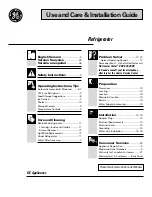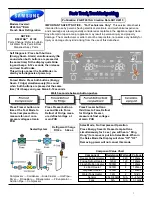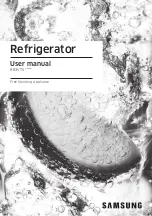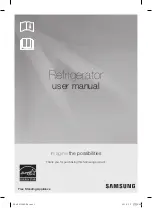
OPERATING YOUR REFRIGERATOR
Set the Temperature Controls
(appearance may vary)
4
The temperature controls let you regulate the temperature in the fresh
food and freezer compartments.
At first, set the Fresh Food control at “5” and the Freezer control at “C.”
Allow 24 hours for the temperature to stabilize, whether you are
setting the controls for the first time or adjusting them later. Then, if
you want colder or warmer temperatures in either compartment, adjust
the controls one step at a time.
NOTE: Moving the Fresh Food control to OFF turns off cooling in
both compartments—fresh food and freezer—but does not shut off
power to the refrigerator.
OFF
1
3
5
7
9
A B C D E
Freezer Control
C is Initial Setting
E is Coldest
How to Test Temperatures
Use the milk test for the fresh food compartment. Place a container
of milk on the top shelf in the fresh food compartment. Check it a day
later. If the milk is too warm or too cold, adjust the temperature controls.
Use the ice cream test for the freezer compartment. Place a
container of ice cream in the center of the freezer compartment. Check
it after a day. If it’s too hard or too soft, adjust the temperature controls.
Always allow 24 hours for the refrigerator to reach the
temperature you set.
Automatic Energy Saver System
No Defrosting
You won’t find an “energy saver” switch on this refrigerator.
Warm liquid from the refrigerator’s condenser is automatically
circulated around the front edge of the freezer compartment to help
keep moisture from forming on the outside of the refrigerator during
humid weather.
Many refrigerators use special electric heaters. This refrigerator needs
none. That’s why there is no “energy saver” switch…there’s no need
for it.
It is not necessary to defrost the freezer or fresh food compartments.
Your refrigerator is designed and equipped to defrost itself automatically.
If you turn your household thermostat below 60°F. (16°C.) at night…
…you may want to move the freezer control one
step colder. Cooler temperatures in the house may
cause the compressor to operate less frequently,
thus allowing the freezer compartment to warm
somewhat. To protect your frozen food supply,
leave the freezer setting at this colder setting for
the entire winter or for as long as you keep your
thermostat turned down.
Moving the freezer control to colder setting should have no effect on
your fresh food compartment. However, if freezing occurs, move the
fresh food control one step warmer.
When you stop turning the thermostat down, turn the refrigerator’s
controls back to their regular settings.





































